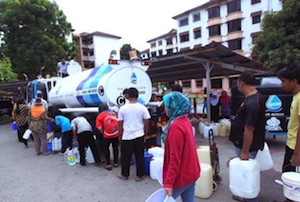Dry taps in ‘most developed’ state
Maria J. Dass, fz.com
WATER rationing in the Klang Valley which was scheduled to end on March 31 has now been extended to April 30, with even more households being affected. It is hard to comprehend how the most developed state ends up in this quandary.
So much time has been wasted by both the state and federal governments over agreements on water restructuring in the state and the Langat 2 water treatment plant. Discussions have dragged on for over five years and despite a Memorandum of Understanding signed in late February, there are still loose ends to be tied up.
Now concerns are being expressed over Putrajays’s commitment to the deal, namely the Federal government’s apparent reluctance to invoke the Water Services Industry Act 2006 (WSIA) to facilitate the takeover of the water industry by the Selangor Government.
In the meantime, the long overdue 44.6km raw water tunnel to connect the Pahang River to the Hulu Langat Treatment Plant (Langat 2) in Selangor is expected to bring some respite to the water shortage that hits the Klang Valley every dry season.
But even way before plans were made for the raw water tunnel to be built, there was much talk by then state administration, agencies involved and stakeholders on alternative water sources for the state.
This include sourcing for ground water and plans to implement rain water harvesting systems in new housing projects as a means to reduce the consumption of treated water.
The idea of rain water harvesting was discussed at length. It involved the harvesting or rain water which will be channeled into storage tanks to be used for household washing, cleaning, toilet, garden and other tasks that do not require treated water.
Some might say that this may be of little use during a drought, but it could very well keep water levels at our dams up.
I’ve attended conferences where ideas such as these are mooted, presented, spoken about extensively, and agreed upon as being good, but that’s where they also end.
Hundreds of housing developments that came up since then, but even joint venture developments between state and private companies failed to implement the ideas discussed in the various forums.
When the weather cools and the rains return, these ideas are forgotten until the next bout of dry weather.


